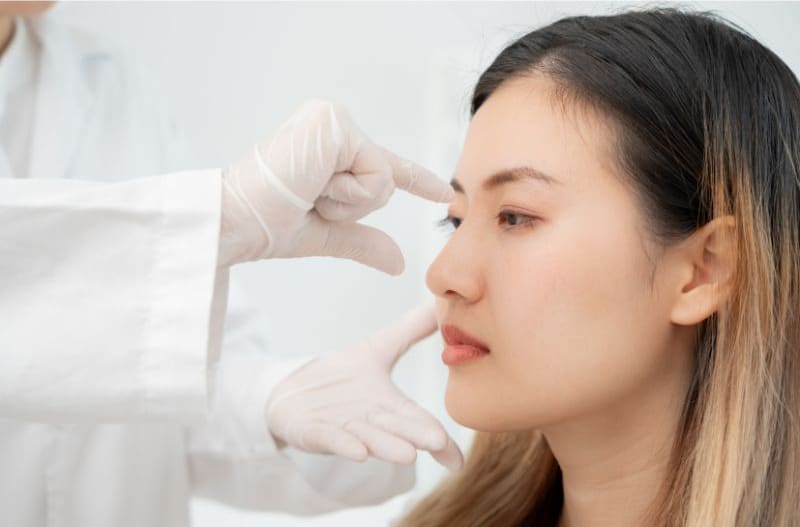How To Choose the Right Plastic Surgeon
Written by: Dr. Dahlia Rice. Posted in: Blog

Plastic surgery has seen significant progress since its initial rise in popularity decades ago. The techniques have become more advanced in terms of sophistication and safety. This has also led to a notable increase in both men and women feeling at ease with the concept of improving their appearance through plastic surgery in Chicago.
Surgeries such as breast augmentation and liposuction, in the realm of plastic surgery, consistently maintain their status as the most sought-after surgical procedures globally. In the year 2018 alone, plastic surgeons in the United States attended to more than 250,000 patients for each of these treatments.
If you’ve made the decision to proceed, you’ve likely invested considerable time contemplating the process of locating a skilled board-certified plastic surgeon. Even when conducting online searches using terms such as “locate top plastic surgeons in Chicago” or “best plastic surgeons in my area,” you’ll likely encounter numerous potential choices while searching cosmetic surgeons.
Table of Contents
ToggleChoosing a Plastic Surgeon For You
Everyone has a different medical history. Ensure that you choose a plastic or cosmetic surgeon with plastic surgery certification from the American Board of Plastic Surgery. This is the sole board acknowledged by the American Board of Medical Specialties.
While a cosmetic surgeon may also hold a plastic surgery certification from other specialty boards like the American Board of Cosmetic Surgery, their primary certification should be from the American Board of Plastic Surgery. This guarantees the best female plastic surgeon or male plastic surgeon, and they adhere to the highest patient safety standards of education, training, safety, and ethics.
Consider the Plastic Surgeons Experience
it’s crucial to inquire about a plastic surgeon’s experience and expertise before undergoing any procedure or surgery to alter your appearance. Here are some key questions you may want to ask about their plastic surgery training:
-
How many patients have you done plastic surgery for with my specific condition?
- This question helps you gauge the surgeon’s familiarity with your particular concerns. The more experience they have with cases similar to yours, the more confident you can be in their ability to address your needs.
-
How frequently do you perform surgery? The plastic surgery I’m considering?
- The frequency of performing a specific plastic surgery procedure is an important factor. Plastic surgeons who regularly perform a particular plastic surgery tend to have more refined skills and a better understanding of potential complications and variations.
-
What is your success rate with this procedure?
- Inquiring about success rates during cosmetic surgery can provide insights into the cosmetic surgeon’s track record. A high success rate may indicate a surgeon’s competence and ability to achieve positive outcomes for their patients.
-
Can I see before-and-after photos of previous patients who underwent a similar plastic surgery?
- Visual evidence of the plastic surgeons work can give you a better idea of their aesthetic style and the results they can achieve. It also allows you to see if their outcomes align with your expectations.
-
What complications have you encountered in plastic surgery, and how do you handle them?
- The right surgeon is board certified and should be transparent about potential complications and have a clear plan for addressing them. Understanding how they handle challenges can provide reassurance about their preparedness and expertise.
-
Are you board-certified in the relevant specialty?
- Board certification is an important indicator of a cosmetic surgeon’s training and competence. It ensures that it is the right plastic surgeon for the procedure, and has met specific educational and practice requirements in their field.
-
Can you provide patient reviews or references from other cosmetic surgeons?
- Hearing about other patients’ experiences can provide valuable insights. Testimonials or references allow you to learn more about the surgeon’s bedside manner, communication skills, and overall patient satisfaction.
-
What is the recovery process like for plastic surgery, and what kind of post-operative care do you provide?
- Understanding the recovery process for plastic surgery and post-operative care is crucial for managing expectations and ensuring a smooth recovery. A good board-certified surgeon will provide clear instructions and ongoing support.
*You can also use this time to vet your board-certified anesthesiologist.
- Will my health history and the medications I am currently taking mean the risks, possible complications, and benefits will be different for me?
- What are my anesthesia options?
- Are they different for the plastic surgery field?
- Do the types of surgical procedures matter?
- What kind of anesthesia is best for me considering my health history, the prescription medications, and vitamins/herbs I take?
By asking these questions, you can make a more informed decision about the surgeon’s qualifications and suitability for your specific needs. Always prioritize your safety and well-being when considering cosmetic or reconstructive procedures.
Ask to See Before and After Photos

Assess the Doctor’s Communication Style
In your first plastic surgeon consultation, inquire and converse about your preferences. It’s important to find a physician who actively listens, provides understandable answers to your queries, and values your choices. Your surgeon should demonstrate empathy, and you should feel at ease discussing your medical history with them.
Ask Where Surgical Procedures are Performed
If contemplating cosmetic surgery, make sure to vet the facility where the procedure is scheduled to take place. Ensure that it adheres to rigorous safety standards and maintains access to life-saving equipment around the clock. Certification from either the Joint Commission, the American Association for Accreditation of Ambulatory Surgery Facilities, or the Accreditation Association for Ambulatory Health Care should validate the facility’s standards.
In order to find out if a facility is accredited by a credible organization, you should look for at least one of the following certifications:
- State licensure
- Joint Commission on Accreditation of Healthcare Organizations (JCAHO)
- American Association for Accreditation of Ambulatory Surgery Facilities (AAASF)
- Accreditation Association for Ambulatory Health Care
- Title XVIII Medicare participation
Make Sure Your Surgeon Has Hospital Privileges
Ensure that a surgeon has hospital privileges in one or more facilities. It is essential for conducting cosmetic or plastic surgery procedures in a hospital setting, even when the procedure takes place in an outpatient facility.
Hospitals offer an additional layer of scrutiny to verify that physicians have the requisite education and training to execute the procedure safely.
Ask About Follow-Up Care
Your board-certified surgeon should act as a guide during the recovery process. Inquire about post-operative appointments, procedures for managing complications, and the doctor’s protocols in case surgical revisions are required.
Know What Your Insurance Covers
Health insurance typically does not cover cosmetic plastic surgery, or most reconstructive surgery. You will likely probably be responsible for covering the entire expense yourself. However, certain reconstructive plastic surgeries aimed at addressing congenital defects or severe burns may receive partial or full coverage.
In some places, state regulations require health insurance to include coverage for post-mastectomy breast reconstruction as part of breast cancer treatment. To confirm whether your specific plan is accepted, it is advisable to get in touch with the surgeon’s office to find out what plastic surgery procedures are covered by insurance.
Are you contemplating a cosmetic procedure in Chicago, IL?
Schedule Your Plastic Surgery Consultation Today!
The reality is that there isn’t a universally applicable approach to plastic surgery or a surgeon that suits everyone. Even if you opt for identical procedure as someone else, you might discover that their board-certified surgeon doesn’t resonate with you, and that’s perfectly fine.
This experience of plastic surgery is highly personal, and what works for your neighbor may not be suitable for you. Seasoned cosmetic surgeons recognize this. Cosmetic surgeons that are board certified won’t push you to decide hastily or undergo a procedure before you feel prepared. To understand what options are best for you, schedule a confidential consultation with the esteemed board-certified plastic surgeon, Dr. Rice.
During your plastic surgery consultation, Dr. Dahlia Rice of DMR Aesthetics Chicago will carefully assess your needs, discuss your primary concerns and objectives, and delve into your medical history. Additionally, you’ll have the opportunity to view before-and-after photos see if plastic surgery financing is four you. Showcasing the plastic surgery procedures and cosmetic surgery that board certified Dr. Rice has done previous patients.
References
https://www.plasticsurgery.org/patient-safety?sub=Choose+a+Plastic+Surgeon+You+Can+Trust
